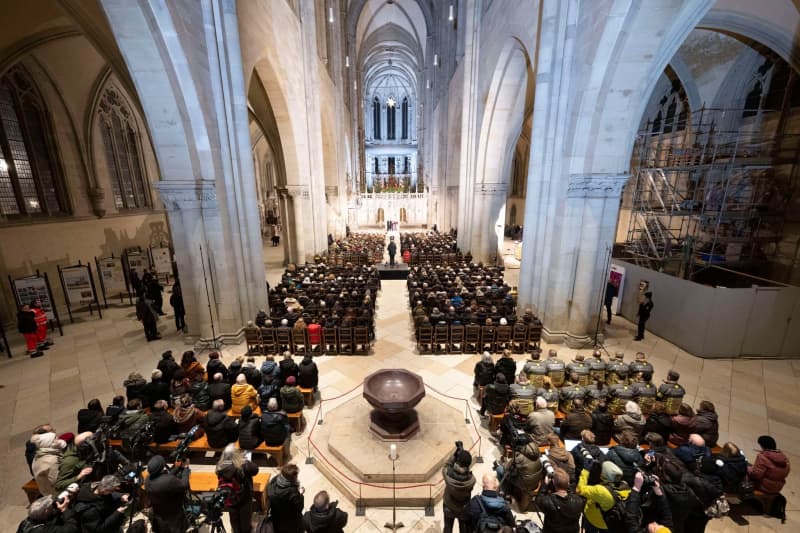On a somber evening in Magdeburg, over a thousand people gathered to honor the victims of a tragic attack that occurred at a Christmas market, which took place just a day earlier. The gruesome event left five people dead, including a nine-year-old child, and resulted in around 200 more being injured when a car careened through the bustling festive gathering on Friday night. Authorities quickly arrested the perpetrator, a 50-year-old man identified as Taleb A, hailing from Saudi Arabia. The gathering included grieving family members, emergency responders, and prominent figures like German President Frank-Walter Steinmeier and Chancellor Olaf Scholz, who attended a somber memorial service in the city’s cathedral.
During this poignant occasion, Bishop Friedrich Kramer reflected on the tragedy, stating the Christmas market—long considered a haven of joy and peace—had been irrevocably tainted. Chancellor Scholz visited the site prior to the service, describing the incident as a “terrible, insane act” against the backdrop of what should be a joyous season. Stressing the horror of the attack, he called for unity and resilience among the populace, emphasizing societal harmony in the face of such brutality. At the memorial service, around 1,000 people congregated outside the cathedral to participate in memorial activities, paying their respects by laying flowers and lighting candles.
The bells of the cathedral tolled exactly one day after the tragedy, marking the time of the incident that transpired shortly after 7 PM. In contrast to the memorial, gatherings in the city also witnessed the presence of far-right groups, who demonstrated with slogans and flags representing the ultra-nationalist Homeland party. While Magdeburg, with a population of approximately 237,000, was home to collective mourning on one side, the far-right factions introduced a disturbing dichotomy of sentiments that underscored underlying societal tensions.
In the aftermath of the attack, authorities heightened security throughout Germany’s Christmas markets to avert any further acts of violence. The investigation into the attack revealed that Taleb A acted alone, facing five charges of murder and 200 counts of attempted murder with serious injury. Local officials confirmed that the assailant exploited an escape route—initially designed for rescue operations—that lacked adequate protective barriers. Despite prior adjustments made to security measures, the incident exposed vulnerabilities in the city’s approach to protecting public gatherings during the festive period.
The suspect, identified as Taleb A, had surfaced previously as an Islam-critical activist, voicing his discontent with perceived leniencies in combatting Islamism within German society. He began his journey in Germany after moving there in 2006 and attaining political refugee status in July 2016. Details of his life indicated a professional background as a psychiatrist, yet authorities have struggled to clarify his motivations for committing such an abhorrent act, with speculation surrounding his dissatisfaction with the treatment of refugees from Saudi Arabia in Germany.
Notably, Saudi Arabian security sources claim they had alerted German authorities about Taleb A prior to the attack, having expressed concerns over his radical opinions. Reports suggested that the Saudi government had sought his extradition, but German officials did not respond. Taleb A’s Shia Muslim background profoundly colored his experiences, as he came from a minority group within Saudi Arabia, often subjected to systemic discrimination. The tragic attack, thus, not only reflects a profound loss on a personal level for the victims and their families, but also raises significant questions about societal divisions, the nature of activism, and the responsibilities of authorities both domestically and internationally in preventing such acts of violence.

